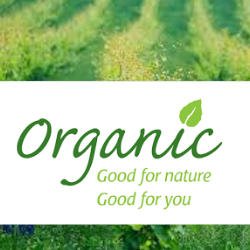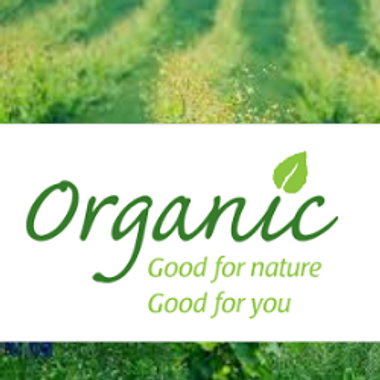7 Reasons to Choose Organic Coffee
Posted by Mark Bentham, The Coffee Man on 28th Jan 2019
I am passionate about making the right choices for our environment, our family and our customers. The livelihoods and futures of my coffee growing communities are also a defining aspect when I choose which direction to take when it comes to choosing the very best beans for roasting at Kimberley Coffee Company.
Check out my latest Coffee Shot where I am talking about the importance of Organic Coffee
The question of organic versus non-organic coffee comes up a lot over a morning brew conversation at The Coffee Van in Broome, and I hope that I can clarify for you below just why you really should not drink anything aside from organic coffee moving forward. Too many good reasons not to, starting with… The Taste!
1. Taste
Organic, Fairtrade coffee is richer in flavour and free from chemicals.
Just like a fresh, homegrown tomato is more flavoursome and just tastes like sunshine, the coffee that is produced from good farming, using no chemicals and growing it in its natural state will taste better because it has a cleaner makeup.
Also, as organic coffee yields a higher income for farmers than non-organic types, the farmers tend to take better care of their crops and the way they are harvested, meaning a better taste result and better consistency.
2. Ecosystem Protection
Non-organic coffee is grown with synthetic fertilizers and pesticides, and with its volume of production booming, can be very destructive to sensitive ecosystems when grown incorrectly.
In Colombia, a coffee supplier which has mostly full sun, non-organic coffee plantations, more than 440,000 tons of chemical fertilizers are applied to coffee crops.
The side effects of this are that the chemicals are absorbed into the ecosystem, water channels, and air. This creates irrevocably long term issues for crops, animals, and people who are exposed to it.
By choosing organic coffee you are encouraging a better ecosystem environment of the farmers and their communities, and the future earth.
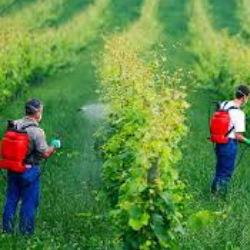
3. Support Better Farming
If you drink two coffee cups a day, in a year, you will consume the harvest of about 18 coffee trees.
A coffee bean is actually part of the berry that is grown on the coffee tree. Each coffee tree yields roughly 1 pound of coffee beans per year. Organic coffee sales continue to climb each year. More and more global citizens are concerned with the fate of the environment and are willing to purchase organic coffee over other non-sustainable choices!
Choosing organic coffee helps to encourage better farming practices and a more wholesome final product.
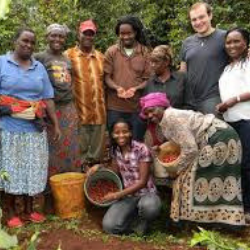
4. Combat Global Warming
Coffee plants are naturally rainforest floor based plants. The shade and the eco-community within the rainforest assist them to grow and flourish.
With the massive demand for coffee, farmers have turned to non-shaded plantations and instead use chemicals, pesticides, and fungicides to assist with the faster growth of the plants.
Organic farmers must choose shaded plantation methods in order to protect the plants from sun, insects, and hazards.
Shade grown coffee plantations include a diverse array of tree species that provide a shade-giving canopy over the coffee plants. These coffee plantations are a rich source of oxygen for the environment and work on removing greenhouse gases like carbon dioxide.
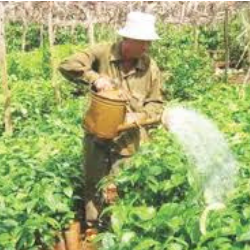
5. Save Water
A study conducted in the late eighties found that coffee plantations in Central America polluted more than 29 million gallons of water daily. This is the equivalent of a city with 4 million citizens dumping their sewage into the local rivers day after day.
Eco-friendly, organic farms use much less water and make an effort to dispose of it properly.
In Colombia, a large coffee supplier which has mostly non-organic, full sun coffee plantations, more than 440,000 tons of chemical fertilizers are applied to coffee crops.
Still, although few plantations are organic, shade grown, or fair trade, the higher market value of these coffees encourages more farmers to revert to environmentally friendly farming. Supply and demand win in the end!
6. Avoid Health Problems
In non-organic coffee farming, pesticides, insecticides, herbicides, and fungicides are used to maintain the crops and increase a quick and large harvest. The coffee bean absorbs these chemicals as it grows and it is not possible to remove them through a processing method.
Studies have shown that there are some 1,000 chemicals and compounds present in a cup of coffee. It makes sense to be choosing organic as the bean absorbs nutrients, chemicals and compounds from it’s growing environment, and we only want to good stuff!
This is particularly important when it comes to coffee, which is often grown in third world countries that are often limited to use cheaper pesticides which are banned in the western world due to their toxicity. If we are not allowed to use such chemicals in our crops growing here in Australia, why would we choose to consume imported crops that are treated with the very chemicals that are banned?
It is well known that people should choose organic where possible, but certain foods are more susceptible to chemical transfer than others. A thickly skinned banana which is peeled before eating will absorb fewer chemicals than a berry that is consumed whole. Remember, a coffee bean is actually a little berry, and absorbs a lot from its environment.
By consuming non-organic foods, chemicals WILL be passed into the body. The body, unable to process these toxins, stores them in the body deposited in fat cells, where they promote cancer and damage the reproductive and nervous systems of humans.
Pesticides have even been linked to a wide range of health problems, including cancers such as prostate, Parkinson’s disease, and even miscarriages in some pregnant women.
I cannot state strongly enough the need to choose organic when choosing your coffee if you want to keep your health a priority.
7.Get the good stuff into your body
100% certified organic coffee contains amazing vitamins, minerals, and antioxidants needed by the body for several health benefits such protection from cell damages and boosting the immune system. Pure organic caffeine in strong coffee acts as an energy booster and enhances great brain function.
Our recent blog about Cold Brew Coffee and it’s health benefits will remind you of all the great benefits coffee offers your health.
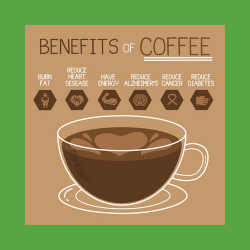
But....Can I Really Make A Difference?
Although few plantations are organic, shade grown, or fair trade, the higher market value of these coffees encourages more farmers to revert to environmentally friendly farming. So your choice IS bringing change.
In order to get the good stuff, you have to choose the good stuff.
At Kimberley Coffee, we are focused on creating better farming environments, better health and creating the best tasting coffee possible. We support Fairtrade, organic, sustainable coffee growers. Here is a link to our Kimberley Coffee Fairtrade beans, which we are proud to say are not only roasted with love and care but are grown with love and care for both today and tomorrow.
